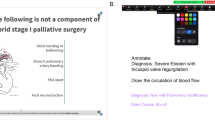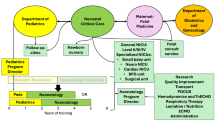Abstract
Background
Neonatal neurocritical care (NNCC) is a rapidly advancing field with limited fellowship training available in locally developed, non-accredited programs. A standardized survey aimed to understand the training backgrounds of individuals practicing NNCC, the structure of existing clinical NNCC services/training programs, and suggested clinical competencies for new graduates.
Methods
We developed an anonymous survey electronically sent to members of societies related to NNCC. Using the survey results as a guide, we discuss a competence by design (CBD) curriculum as a complementary approach to traditional time-based training.
Results
There were 82 responses to the survey from 30 countries; 95% of respondents were physicians. Thirty-one (42%) institutions reported having an NNCC service, 24 (29%) individuals reported formal NNCC training, 81% reported “significant variability” across NNCC training programs, and 88% were both in favor of standardizing training programs and pursuing formal accreditation for NNCC in the next 5 years.
Conclusions
The survey results demonstrate international interest in standardizing NNCC training and development of an accreditation or certification process. We propose consideration of a CBD-type curriculum as a training approach to focus on the development of specific NNCC competencies, rather than assuming the acquisition of these competencies based on time as a surrogate.
Impact
-
Continued growth and development in the field of NNCC has led to increasing need for training programs suited to meet the diverse needs of trainees from varied backgrounds.
-
We present the results of an international survey that assessed the structure of existing training programs and the priority areas in which graduates must demonstrate competence, highlighting the combination of CBD and time-based training as one approach to address these recommendations.
-
The survey results support interest in translating published training competencies, existing expertise, and infrastructure across centers into a standardized curriculum for NNCC including certification opportunities.
Similar content being viewed by others
Log in or create a free account to read this content
Gain free access to this article, as well as selected content from this journal and more on nature.com
or
References
Smyser, C. D. et al. Fellowship training in the emerging fields of fetal-neonatal neurology and neonatal neurocritical care. Pediatr. Neurol. 63, 39–44.e3 (2016).
Song, J. Learner-centered approaches in an international nurse training program. Contin. Educ. Nurs. J50, 183–188 (2019).
Canada TRCoPaso. Competence by Design Technical Guides and Policy (The Royal College of Physicians and Surgeons of Canada, accessed 18 November 2020); https://www.royalcollege.ca/rcsite/cbd/technical-guides-and-policy-e.
Canada TRCoPaSo C. CanMEDS Interactive Guide 2015 (The Royal College of Physicians and Surgeons of Canada, accessed 18 September 2020); http://canmeds.royalcollege.ca/guide.
Canada TRCoPaSo. What is Competence by Design? (The Royal College of Physicians and Surgeons of Canada, accessed 18 November 2020); https://www.royalcollege.ca/rcsite/cbd/what-is-cbd-e.
Canada TRCoPaSo. Competence Committees (The Royal College of Physicians and Surgeons of Canada, accessed 18 November 2020); https://www.royalcollege.ca/rcsite/cbd/assessment/competence-committees-e.
Canada TRCoPaSo. CBD Competence Continuum 2015 (The Royal College of Physicians and Surgeons of Canada, accessed 23 April 2021); https://www.royalcollege.ca/rcsite/documents/canmeds/competence-continuum-diagram-e.pdf.
Canada TRCoPaSo. ePortfolio (The Royal College of Physicians and Surgeons of Canada, accessed 18 November 2020); https://www.royalcollege.ca/rcsite/cbd/cbd-eportfolio-e.
Pinsk, M., Karpinski, J. & Carlisle, E. Introduction of competence by design to canadian nephrology postgraduate training. Can. J. Kidney Health Dis. 5, 2054358118786972 (2018).
Al-Qadhi, S. A., Chawla, T., Seabrook, J. A., Campbell, C. & Burhan, A. M. Competency by design for electroconvulsive therapy in psychiatry postgraduate training: face and content validation study. J ECT 36, 18–24 (2020).
Funding
There are no financial relationships to declare.
Author information
Authors and Affiliations
Consortia
Contributions
Substantial contributions to conception and design, acquisition of data, or analysis and interpretation of data: A.K.C., K.M., and C.D.S. Drafting the article or revising it critically for important intellectual content: all authors. Final approval of the version to be published: all authors.
Corresponding author
Ethics declarations
Competing interests
The authors declare no competing interests.
Patient consent
Patient consent was not required for this study; participants consented before filling the survey.
Additional information
Publisher’s note Springer Nature remains neutral with regard to jurisdictional claims in published maps and institutional affiliations.
Supplementary information
Rights and permissions
About this article
Cite this article
Mohammad, K., Craig, A.K., Chang, T. et al. Training in neonatal neurocritical care: a proposal for a hybrid model of competence by design and time-based methods. Pediatr Res 96, 1013–1020 (2024). https://doi.org/10.1038/s41390-021-01727-9
Received:
Revised:
Accepted:
Published:
Issue date:
DOI: https://doi.org/10.1038/s41390-021-01727-9
This article is cited by
-
Neurocritical care
Intensive Care Medicine – Paediatric and Neonatal (2025)
-
Meeting the need for effective and standardized neonatology training: a pan-European Master’s Curriculum
Pediatric Research (2024)
-
Neuromonitoring in neonatal intensive care units—an important need towards individualized neuroprotective care
European Journal of Pediatrics (2024)
-
Variations in care of neonates during therapeutic hypothermia: call for care practice bundle implementation
Pediatric Research (2023)



